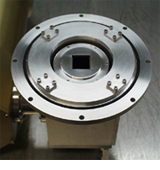Professor

Daniel Jaffe

Office: RLM 17.218
Hours: TBD
Phone: (512) 471-3425
dtj@astro.as.utexas.edu

TA

Shay Holmes
Office: RLM 16.318
Phone: (512) 471-3466
sholmes@astro.as.
utexas.edu
Machinist

Jimmy Welborn
Office: RLM 17.330
Phone: (512) 471-3427
jimmy@astro.as.
utexas.edu
Substitue Professor

John Lacy
Office: RLM 16.332
Phone: (512) 471-1469
lacy@astro.as.
utexas.edu
|
 |
Introduction
This course teaches the fundamentals of the design and construction of experimental apparatus
using astronomical instruments as the model for the process. We will cover key aspects of some of the most
important topics in the field: optics and optical design, mechanical design and machining, electronics design
and fabrication, real-time computer control, project planning, and performance analysis. Since we cannot
teach you everything you need to know in a single semester, we will try to equip you with enough background
to be able to continue learning on your own.
Overall Objectives
By the end of the course, you should have a concrete knowledge of many of the essentials of instrumentation.
You should be able to plan out, schedule, and organize an instrumentation project and have some idea of what
goes into a project budget. You should understand the steps involved in the mechanical, optical, software, and
electronics design. You should have a good working knowledge of where to obtain information you need for your
project in each of these areas. You should have concrete knowledge of computer aided design (CAD) programs
for mechanical design (Inventor), electronics design and simulation (Circuit Maker), and optical design and
simulation (Zemax). You will know how to do basic work with hand tools and with machine shop equipment. You
will be able to assemble and understand some electronics circuits and be able to use laboratory equipment to
test them. You will know the fundamentals of optical design and be able to design and build a grating
spectrometer. You will be able to use LabView to interface an instrument to a computer.
|

